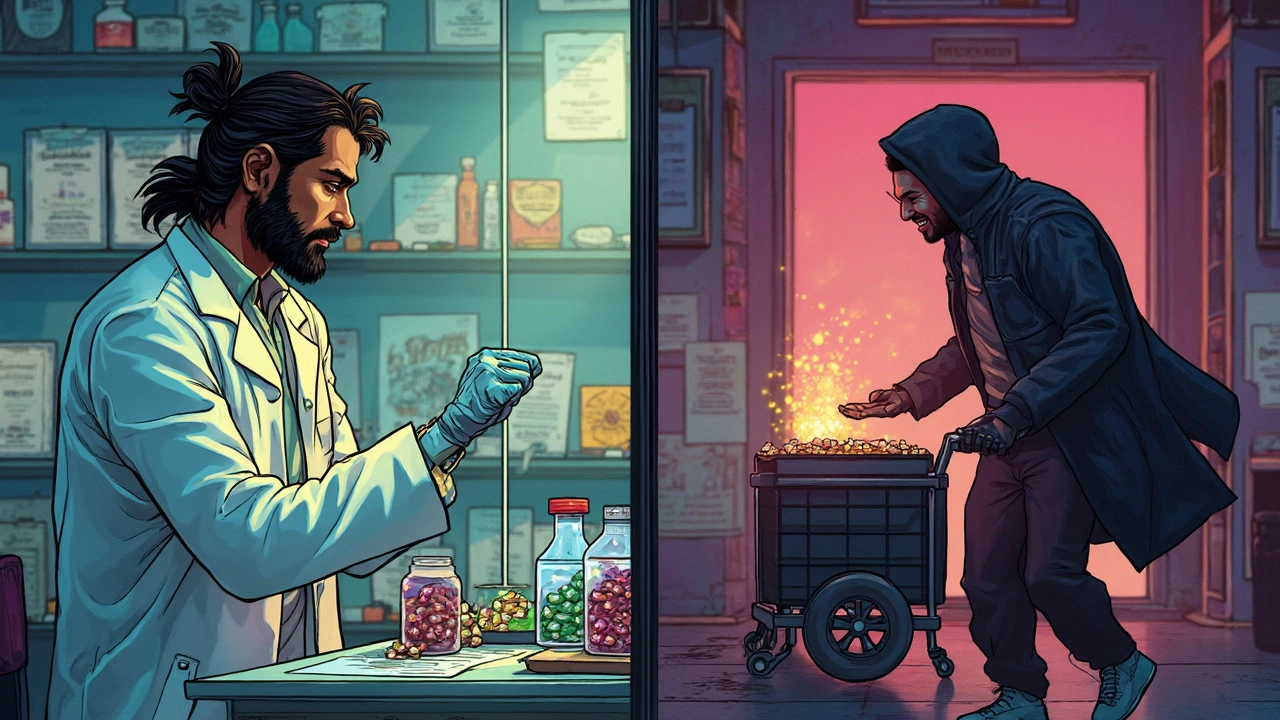It’s wild how shelves today are flooded with thousands of herbal supplements, all promising some miracle fix—better sleep, stronger immunity, a calm mind. But let’s cut to the chase: only a handful of companies actually back up those promises with quality and transparency.
Most people aren’t sure who to trust because this industry is underregulated. You might think a pretty bottle or a high price tag guarantees something good inside. Nope. The real secret? Reputable companies go out of their way to show exactly what’s in their products and how they were tested. They use third-party labs, not just their in-house scientists, to prove what they claim. Anyone not willing to share a Certificate of Analysis (COA) probably has something to hide.
Another thing most people miss: labels that say “natural” or “organic” sound nice, but they don’t mean much unless you can trace where those herbs came from. Quality companies lay it all out—where their plants grew, how they were picked, and the tests done to rule out contaminants or fake ingredients. If that info's hidden—or you have to dig through legal mumbo-jumbo to find it—you’re not dealing with the best.
- How to Spot a Reputable Herbal Supplement Company
- The Role of Third-Party Testing
- Common Red Flags and Industry Tricks
- Popular Brands with Proven Track Records
- Hidden Factors: Sourcing, Ethics, and Transparency
- Tips for Picking the Right Herbal Supplement
How to Spot a Reputable Herbal Supplement Company
If you want to avoid wasting money or risking your health, you need a sharp eye for quality when it comes to herbal supplements. So, what separates the top dogs from the pretenders?
- Transparency: The best brands have nothing to hide. They list every ingredient (no mystery blends) and show exactly where their herbs come from. You should be able to find sourcing info, manufacturing details, and third-party lab results on their website or packaging.
- Certificates of Analysis (COA): Reliable companies test each batch for purity and strength, and they post COAs or give them on request. If a brand dodges your COA question, move on.
- Certifications: Keep an eye out for respected third-party seals—like USP Verified, NSF, or ConsumerLab.com. These aren’t just sticker decorations; they show a product was tested by outside experts.
- Clear Contact Information: It’s a red flag if you can’t easily find a phone number, email, or company address. The legit players don’t hide. They want you to reach them with questions.
- Professional Manufacturing: Top supplement companies use GMP (Good Manufacturing Practice) certified factories. GMP means their processes are regularly checked by independent authorities for safety and quality.
- Real-World Testing: Some standout brands even let you trace your specific bottle with a batch number—a quick scan or search gives you its full testing report.
Here’s a quick look at what to expect from a reputable supplement company vs. a shady one:
| Feature | Real Deal | Red Flag |
|---|---|---|
| Ingredient list | Detailed, no blends | Vague, “proprietary” blends |
| Lab testing | COAs available, batch-specific | No proof of testing |
| Certifications | USP, NSF, or similar | No third-party verification |
| Sourcing info | Clear, traceable | Missing or generic |
| Company info | Easy to contact | Anonymous website |
Quick tip: Don’t trust wild claims like “cures all diseases” or “works instantly.” The law actually says they can’t promise to cure anything. That’s usually a big warning sign. Look for plain, realistic language instead of hype.
The Role of Third-Party Testing
Ever wonder why some herbal supplements brands brag so much about third-party testing? There’s a good reason. Unlike prescription meds, supplements aren’t screened by the FDA before hitting the shelves. This creates a real wild west situation—anyone can toss some powder in a bottle and call it healthy. That’s where honest third-party labs come in.
These labs aren’t on a company’s payroll, so they don’t have a reason to fudge the numbers. They check for stuff like contaminants (think heavy metals, pesticides, or cheap fillers), and they make sure you’re actually getting the amount of the herb the label promises. If a brand pays for third-party testing on every batch—and actually shows you their results—that’s a huge green flag.
Quick reality check: A 2022 ConsumerLab report found that nearly 1 in 5 supplements tested had issues—either the wrong dose, an unlisted ingredient, or stuff that shouldn’t be there. On the flip side, companies like Gaia Herbs and Nature’s Way share their test results online, proving what’s inside each bottle. Want a supplement to really deliver? Demand proof.
| Brand | Shows Third-Party Lab Results? | Randomly Tested By Consumer Watchdogs? |
|---|---|---|
| Gaia Herbs | Yes (QR codes on every package) | Yes, passed most purity tests |
| Nature's Way | Yes (full transparency) | Yes, good results overall |
| Now Foods | Yes (lab reports online) | Yes, consistently passes tests |
| Unknown Discount Brands | No or vague info | Often fail or not tested |
Here’s what’s worth asking before you buy:
- Does the company offer Certificates of Analysis (COA) or post third-party test results? If not, that’s a red flag.
- Are their tests recent and for each batch, not just once a year?
- Are the third-party labs real (check for names like NSF International or USP)?
If you ever spot words like “tested in our state-of-the-art lab” with no mention of outside verification, play it safe and keep looking. Trust only what you can check for yourself.
Common Red Flags and Industry Tricks
The herbal supplement world looks trustworthy at first glance, but there are some sneaky things going on. A top tip: if a company makes wild health claims like "cures cancer" or "works instantly," that’s a giant red flag. Legit brands stick to facts and don’t push miracle results. Spotting these tricks can save you a lot of money—and headaches.
Watch for "proprietary blends" on the label. Sounds fancy, but it often means you can’t see the actual amount of each ingredient. This lets brands skimp on the expensive stuff and load you up with fillers, all while charging you a premium.
Another common trick is the “clinically proven” sticker. Unless the company shows the real study, those words are just fluff. And about labels: if you see long ingredient lists filled with stuff like artificial colors, magnesium stearate, or mystery fillers, it’s usually not a good sign. Pure, high-quality herbal products have short, clear ingredient lists.
- Fake third-party seals: Some brands slap a logo that looks official, but it’s just bad clip art. Real third-party tests lead to a Certificate of Analysis you can actually see (often on the company website).
- Imported products from countries with weak regulations—think super-cheap bottles online—often fail purity or contamination tests. In fact, a 2023 study found nearly 27% of herbal supplements from overseas sellers on popular marketplaces like Amazon fell short on potency or had unsafe levels of heavy metals.
- Lack of lot numbers and expiration dates. Reputable brands track their batches so you can trace every bottle.
Want some cold hard data? Check this out:
| Red Flag | Why It Matters |
|---|---|
| No 3rd party testing info | Can’t confirm what’s inside or if it's safe |
| Vague ingredient list | You don’t know what you’re really taking |
| Health claims that sound too good | Likely breaking FDA rules and exaggerating benefits |
| Unusually cheap prices | May cut corners on sourcing or testing purity |
Stick to great brands by asking questions: Where’s the Certificate of Analysis? What’s the source of each plant? You’ll be amazed at how many companies dodge these simple things. Transparency means confidence in what you’re buying, and your health is worth that extra effort.

Popular Brands with Proven Track Records
If you’re serious about taking herbal supplements and want to avoid getting ripped off, a few brands genuinely deserve the spotlight. These companies don’t just talk—they publish real test results, share sourcing details, and get third-party certifications. Let’s get honest about which names have made a real effort to keep things clean and transparent.
Herbal supplements giant Gaia Herbs stands out because they trace every single batch—from seed to shelf. Scan a QR code on the box, and you land straight on details about that product’s origin and lab analysis. They’re all about organic farming and guarantee no weird fillers or hidden nasties. Gaia’s products regularly pass heavy metals and pesticides testing, and they work with NSF International for added credibility.
Another solid pick is NOW Foods. These guys have been around since the 1960s and are famous for third-party testing. Their website offers downloadable Certificates of Analysis on almost everything. Plus, NOW runs their own state-of-the-art testing lab where they bust fake and contaminated supplements before they hit your bottle. They’re one of the only brands to voluntarily pull lots off shelves if anything is even a little off.
If you want something more boutique, MegaFood puts a big emphasis on transparency. Their products are certified glyphosate-residue free, and they hand over traceability documents online. They get their stuff checked by labs like Eurofins Scientific—so the numbers aren’t just coming from “in-house experts.”
Other trusted names—like Nature’s Way and Solaray—have also stayed consistent with third-party testing and reliable sourcing. Nature’s Way is even in the Non-GMO Project, so if you’re worried about genetically modified ingredients, you’re covered there.
Remember, real brands aren’t shy about showing what’s inside their bottles or sharing the journey their herbs took. If a website hides this info or gives vague answers, it’s a bad sign. Stick with brands that invite you to look behind the curtain.
Hidden Factors: Sourcing, Ethics, and Transparency
Most people never think about where the herbs in their supplements actually come from. But honestly, this stuff matters even more than slick marketing. Take turmeric, for example. If it’s not grown in good soil and harvested right, it can lose potency or get contaminated with heavy metals. Some less-reputable brands get herbs from huge bulk suppliers, often overseas, and never check for pesticides or pollutants. The best companies know exactly which farm or co-op each batch comes from. Gaia Herbs, for example, even lets you track your bottle’s origin down to the field—a level of transparency that’s rare in the supplement world.
The next piece? Ethics. It’s not just about being good people; ethical brands make sure their harvesting doesn’t mess up local ecosystems or exploit workers. Real standouts in the herbal supplements game will have fair-trade certifications or work directly with farmers to guarantee fair pay. This isn’t just feel-good stuff—it actually means you get a better, cleaner product.
Transparency ties it all together. Trustworthy companies publish full ingredient lists, testing reports, and sourcing details online. They respond to consumer questions and make it easy to verify what’s behind the label. If a brand hides these details, turns vague, or gives the runaround, that’s a pretty clear warning sign. Even the National Institutes of Health says,
“Consumers should look for brands that provide detailed information on sourcing, quality control, and third-party testing to ensure authenticity and safety.”
Want a quick way to check if a company’s the real deal? Look for these:
- Batch tracking or source lookup tools on their website
- Published third-party lab results, not just generic claims
- Certifications like USDA Organic, Fair Trade, or Non-GMO
- Clear contact info and responsive customer service
If you can’t get straight answers about sourcing, ethics, or quality, it’s probably time to keep shopping.
Tips for Picking the Right Herbal Supplement
The biggest mistake? Grabbing the flashiest brand or picking whatever’s cheapest. Not every supplement on the shelf is worth your cash—or safe to swallow. Here’s how you raise your odds of actually getting what you pay for.
- Check for third-party testing: Legit companies pay outside labs to test their herbal supplements for potency and purity. Look for seals from USP, NSF, or ConsumerLab. If this info isn’t obvious or isn’t on the company’s website, big red flag.
- Dig into sourcing: Real-deal companies share where their herbs grow and how they’re processed. Ideally, they’ll tell you the country of origin, type of farm, and whether decent labor and environmental practices were used.
- Demand transparency: If you can’t easily access a Certificate of Analysis or up-to-date lab results, that’s a dealbreaker. Don't just trust marketing—always ask to see the proof.
- Watch dosage and serving info: Some products cram in so much filler, you’d need to take handfuls daily just to reach the dose studies recommend. Compare the serving size with the dosage used in real clinical research, which is usually spelled out on reputable health resources.
- Check for recalls and warnings: The FDA keeps an updated list of tainted or recalled herbal products. A quick search can save you money or worse, a hospital visit.
Ever wonder how many supplements get flagged for problems? Here’s a snapshot:
| Year | FDA Herbal Supplement Recalls |
|---|---|
| 2021 | 38 |
| 2022 | 46 |
| 2023 | 54 |
Bottom line: finding truly herbal supplements that are safe and legit takes a little research. Don’t just trust hype or packaging—and always read reviews from sources that don’t sell the stuff themselves.






